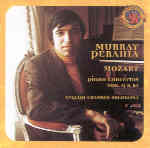Mozart’s innovative K. 271 Concerto in E-flat has been graced with many fine recordings, from Gieseking to Goode, and Murray Perahia’s 1977 traversal (coupled with the K. 467 C major) certainly ranks among the work’s top contenders. The clarity of his articulation at all dynamic levels, his gorgeously varied sonority, and his ability to mesh within and around the English Chamber Orchestra’s vibrant ensemble work pay satisfying dividends upon each relistening. K. 467 fares best in the central “Elvira Madigan” movement’s singing simplicity and in a joyous and upliftingly projected finale. Although the first movement gains momentum as it progresses, more assertive trumpet and timpani plus stronger definition of the important woodwind writing might have suggested more of the music’s inherent pomp. Two bonus tracks generously flesh out this release in the form of the two Concert Rondos, recorded in 1983. Perahia’s incisive, thoughtfully integrated performances elevate these relatively slight works to near-masterpiece status. Save for patches of strident string tone in loud tuttis during the Rondos and K. 271, Sony’s refurbished sonics are excellent.
































